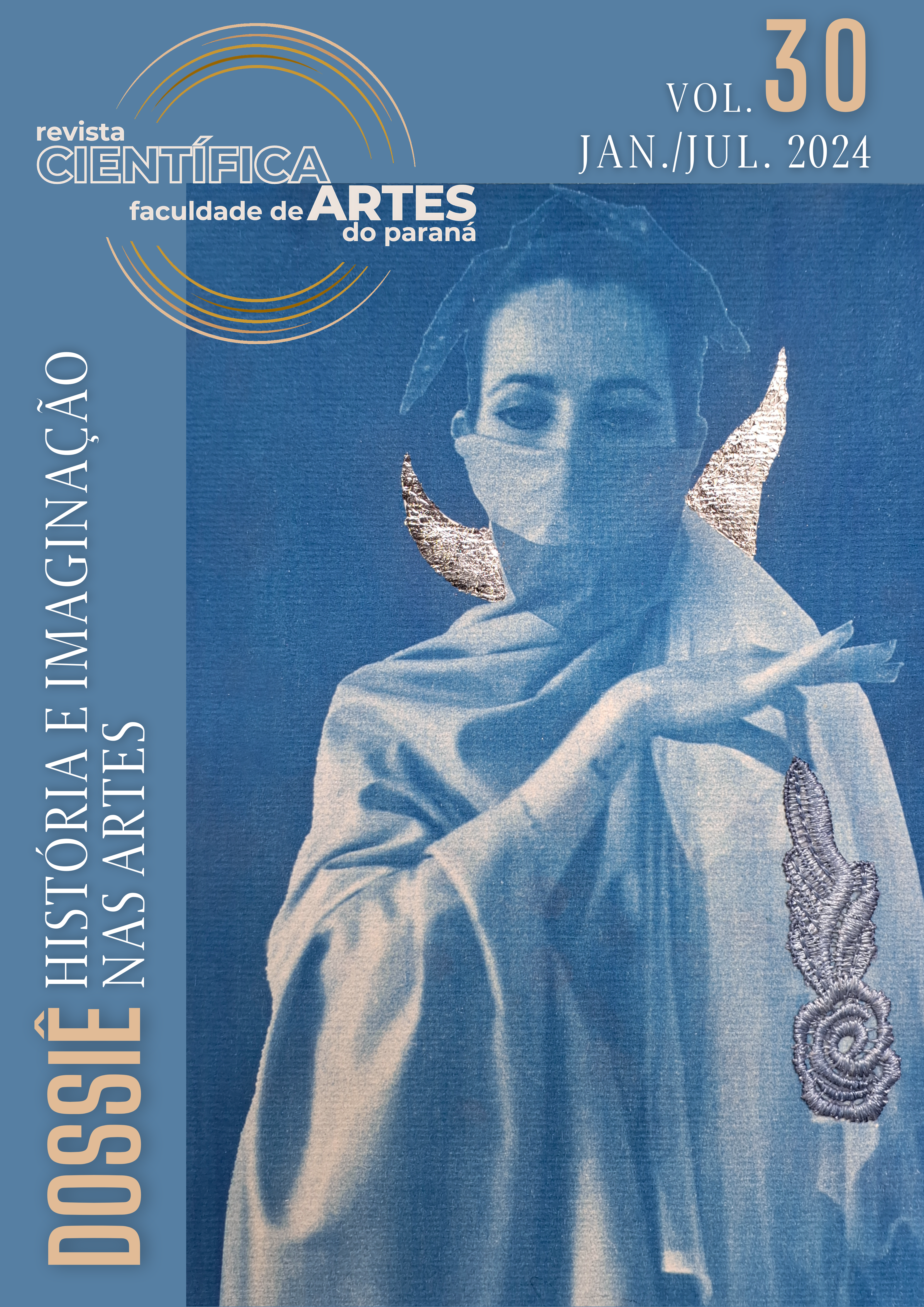A imaginação estilizada no cinema documentário de Werner Herzog
DOI:
https://doi.org/10.33871/19805071.2024.30.1.8812Palavras-chave:
Werner Herzog, Imaginação, Verdade Extática, Cinema DocumentárioResumo
O objetivo deste artigo é analisar como o diretor alemão Werner Herzog utiliza a imaginação para compor sua mise-en-scène documentária, de forma a construir momentos de sublimidade em sua narrativa, denominados de Verdade Extática. Metodologicamente, aplica-se a análise fílmica da imagem e do som (cinematográfica) de Aumont e Marie (2004), utilizada nos documentários O Grande Êxtase do Entalhador Steiner (1974) e Gasherbrum – A montanha luminosa (1984). Em ambos os filmes, os protagonistas se engajam em esportes de aventura que destacam a importância do movimento físico, elemento significativo na narrativa herzoguiana. Desse debate, emergem formas imaginativas em Herzog com constante uso de ensaio, repetição e autorreflexão, características utilizadas para que seus personagens alcancem a Verdade Extática.
Downloads
Referências
AMES, Eric; HERZOG, Werner. Werner Herzog: Interviews. Mississippi: University Press of Mississippi, 2014.
AMES, Eric. Ferocious Reality: Documentary according to Werner Herzog. Minneapolis: University of Minnesota Press, 2012.
AUMONT, Jacques; MARIE, Michel. A análise do filme. 3.ed. Lisboa: Texto & Gráfica, 2004.
COOK, Roger. The Ironic Ecstasy of Werner Herzog: Embodied Vision in The Great Ecstasy of Woodcarver Steiner. In: PRAGER, Brad. (Org). A Companion to Werner Herzog. Chichester (UK): Willey Blackwell, 2012.
CRONIN, Paul; HERZOG, Werner. Werner Herzog - A Guide for the Perplexed: Conversations with Paul Cronin. London: Faber & Faber, 2014.
DUERFAHRD, Lance. Tantrum Love: The Fiendship of Klaus Kinski and Werner Herzog. In: PRAGER, Brad. (Org). A Companion to Werner Herzog. Chichester (UK): Willey Blackwell, 2012.
FRAZÃO, Jéssica. A representação da realidade no cinema documentário: Verdade e Imaginação pelos cineastas do Novo Cinema Alemão. In: PENAFRIA, Manuela; et al. Revisitar a Teoria do Cinema. Teoria dos Cineastas. Vol. 3. Covilhã: Labcom, 2017.
HERZOG, Werner. The Minnesota Declaration - Truth and fact in documentary cinema "LESSONS OF DARKNESS" (1999). Disponível em: < https://www.wernerherzog.com/text-by-werner-herzog.html >. Acesso em: 12 fev. 2024.
HERZOG, Werner. Conquista do inútil. Trad. Renata Dias Mundt, São Paulo: Martins Fontes, 2013.
HERZOG, Werner. Caminhando no gelo. Trad. Lúcia Nagib. Rio de Janeiro: Paz e Terra, 1982.
JOHNSON, Laurie. Werner Herzog’s Romantic Spaces. In: PRAGER, Brad. (Org). A Companion to Werner Herzog. Chichester (UK): Willey Blackwell, 2012.
MACKENZIE, Scott. Film Manifestos and Global Cinema Cultures: a Critical Anthology. Berkeley: University of California Press, 2014.
NAGIB, Lúcia. Werner Herzog: o cinema como realidade. São Paulo, Estação Liberdade: 1991.
PEUCKER, Brigitte. Herzog and auteurism: Performing authenticity. In: PRAGER, Brad. (Org). A Companion to Werner Herzog. Chichester (UK): Willey Blackwell, 2012.
PRAGER, Brad. The cinema of Werner Herzog: aesthetic ecstasy and truth. London: Wallflower press, 2007.
WALLER, Gregory A. “The Great Ecstasy of the Woodsculptor Steiner": Herzog and the "Stylized" Documentary. Film Criticism. Vol. 5, No. 1. Fall, 1980.
WAUGH, Thomas. Acting to play oneself: Notes on performance in documentary. In: Right to Play Oneself: Looking Back on Documentary Film. Minnesota: University of Minnesota Press, 2011.
Referências audiovisuais
Fitzcarraldo, direção: Werner Herzog, Alemanha Ocidental, 1982.
Gasherbrum – A montanha luminosa, direção: Werner Herzog, Alemanha, 1984.
Meu melhor inimigo, direção: Werner Herzog, Alemanha, 1999.
O grande êxtase do Entalhador Steiner, direção: Werner Herzog, Alemanha, 1974.
O pequeno Dieter precisa voar, direção: Werner Herzog, Alemanha,1997.
Sinais de vida, direção: Werner Herzog, Alemanha Ocidental,1968.
Tokyo-Ga, direção: Wim Wenders, Alemanha Ocidental, Estados Unidos, 1985.
Visita ao inferno, direção: Werner Herzog, Áustria e Reino Unido, 2016.
Downloads
Publicado
Como Citar
Edição
Seção
Licença
Os autores detém os direitos autorais, ao licenciar sua produção na RevistaCientífica/FAP, que está licenciada sob uma licença Creative Commons. Ao enviar o artigo, e mediante o aceite, o autor cede seus direitos autorais para a publicação na referida revista.
Os leitores podem transferir, imprimir e utilizar os artigos publicados na revista, desde que haja sempre menção explícita ao(s) autor (es) e à Revista Científica/FAP não sendo permitida qualquer alteração no trabalho original. Ao submeter um artigo à Revista Científica/FAP e após seu aceite para publicação os autores permitem, sem remuneração, passar os seguintes direitos à Revista: os direitos de primeira edição e a autorização para que a equipe editorial repasse, conforme seu julgamento, esse artigo e seus metadados aos serviços de indexação e referência.


